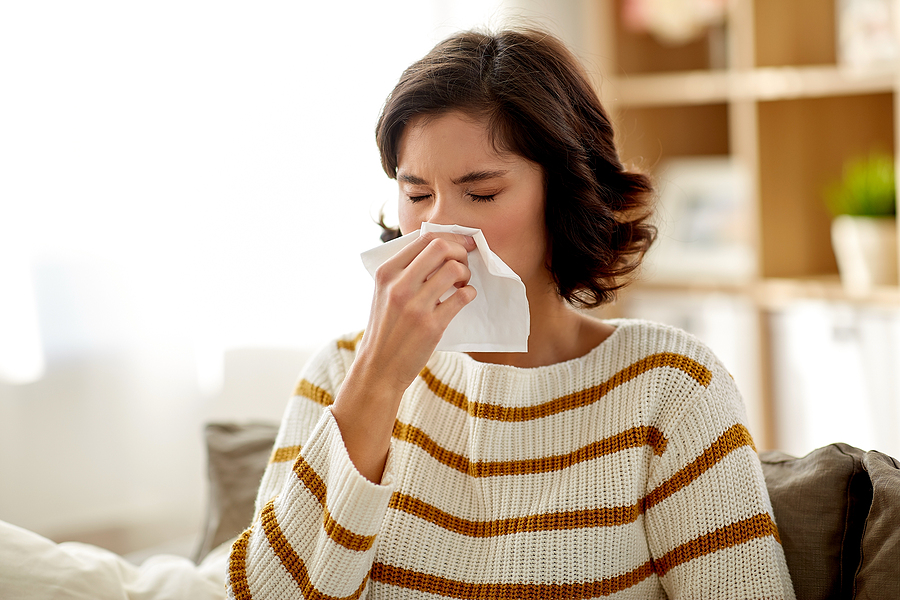The Link Between Stress and Allergy Flare-Ups: What You Can Do About It
Posted By:SSG Admin Posted On:23-Oct-2024
Stress doesn’t cause allergies like eczema. However, people with allergies may find the symptoms flare up when they’re experiencing high levels of stress. When you can’t eliminate all stress from your life, what can you do to minimize allergy symptoms from flaring up?
Why Do Allergy Symptoms Increase When You’re Stressed?
Stress increases the production of cortisol. Cortisol is a stress hormone responsible for increased levels of blood sugar and glucose. It also limits certain body functions when you’re experiencing anxiety’s fight-or-flight response. One of those functions is the immune response. It’s slower, and that can allow allergens to impact you more than usual.
When you’re stressed, your body’s inflammation levels also increase due to higher cortisol levels. Your body focuses on repairing damaged tissue caused by inflammation. With inflammation heightened, you’re going to experience heightened allergy symptoms.
Cortisol usually balances out as you ease the stress you’re experiencing. However, some people struggle with chronic stress, so cortisol is always high. Long-term exposure to stress and high cortisol levels often causes weight gain, tension headaches, muscle pain, insomnia, and depression. Learning how to manage stress not only helps with allergy flare-ups, but it’s also good to ease inflammation due to its link to high blood pressure and heart disease.
Tips for Managing Stress
You can’t keep stress from happening, but you can learn techniques for managing stress. Start by trying to pinpoint your stress triggers. Do you find yourself clenching your jaw when a difficult customer enters your business? You can’t give up your business, but you could have an associate handle that customer in the future. It also might be time to change roles within your business.
Exercise is a great way to lower cortisol. Aim for at least 150 minutes of moderate activity each week. Use variety to keep things from feeling dull or boring. Instead of the same Yoga workout every day, do Yoga a couple days per week, take a long walk on a nature trail on the weekend or your day off, and go swimming another day.
Make sure your home is designed to be low-stress. Keep it clean and organized. When there’s too much clutter, it becomes irritating and the frustration adds to your stress. If you find yourself bringing too many items into your home, make sure you consider where it will go before you purchase it or pick it up. That free bookshelf on the side of the road may seem too good to pass up, but it’s not useful if you don’t have room for it.
If you feel that your stress is out of control, talk to a professional. It’s often helpful to vent your fears, frustrations, and anxiety to someone who knows techniques for reducing stress and anxiety. The other reason is to work with a professional who can teach what to do when stress increases and if medications for chronic stress are recommended.
Common Allergy Symptoms Exacerbated by Stress
When you’re stressed and cortisol increases, you’ll find that many common allergy symptoms increase. Over-the-counter allergy medications aren’t working effectively. The symptoms that are likely to feel worse include:
Allergy-based asthma attacks
Hives
Itchy, watery eyes
Nasal congestion
Runny nose
Skin rashes
Create a Balance to Better Manage Stress and Allergies
You can’t avoid stress, so how can you manage it to limit the cortisol increase? Take care of yourself with these steps.
Avoid Allergens as Much as Possible
Make your home an allergy-free zone. If you’re allergic to dust mites, consider replacing carpeting with hardwood floors that are easy to clean. If you’re looking for a green-friendly option, bamboo is a great choice.
Run an air purifier in the main rooms or look into an HVAC system that includes UV to kill bacteria and mold spores. Make sure you clean or change filters regularly. If you purchase an air purifier, make sure it’s designed to clean the air in the square footage you plan to use it in.
A higher Clean Air Delivery Rate (CADR) rating is going to clear allergens from the air faster than a model with a lower CADR rating. Look at the allergens it’s able to clean from the air. HEPA filters are best at cleaning the air of smaller particles.
If you know you’re allergic to a specific type of tree pollen, make sure those trees are not in your yard. It may be impossible to remove them all from your area, but those closest to your windows should be removed.
Continue to Do Things That Reduce Your Stress
Don’t allow stress to build up without any release. What makes you happiest? Do you enjoy playing board games or video games? Does reading in the sun help you de-stress? Maybe you’d rather go for a walk in the woods, stroll along a beach, or take out your frustration while kneading dough before baking bread. Whatever it takes, make sure you do something that helps ease the tension.
Tai Chi and Yoga are two practices that can help you ease stress through gentle movements and breathing exercises. Yoga is a mind and body practice, while Tai Chi is a form of martial arts. Look into programs where you learn these movements and breathing strategies with an expert instructor.
Eat Foods That Help With Inflammation
While there are no tried-and-true diets that eliminate inflammation, certain foods can help reduce inflammation. Aim for those foods as part of your healthy diet. Foods and beverages that do help with chronic inflammation include the following.
Beans and lentils
Fruits and vegetables of all colors
Fiber-rich carbohydrates like barley, quinoa, and whole oats
Fish
Green tea
Nuts and seeds
Plant-based proteins like tempeh and tofu
Spices like garlic, ginger, and turmeric
Get Enough Sleep
Sleep helps your body heal and recuperate. Make sure you’re getting 7 to 8 hours of sleep each night. If you’re prone to insomnia, do things that can help make it easier to fall and stay asleep. Instead of watching TV before going to bed, read a book. Block out bright LED lights on things like air conditioner displays, air purifiers, or fans.
Keep something running for white noise. You want to block out noises from outside that might wake you up, such as a car with a loud muffler. The noise of a fan helps a lot with jarring sounds in and outside your home.
Schedule an Appointment With an Allergy Specialist
Easing stress is one step towards an allergy-free life. The second step is to schedule an appointment with Premium Allergy. You can’t eliminate all stress from your day, but you can help your body learn how to manage the histamine response through medications or immunotherapy.





